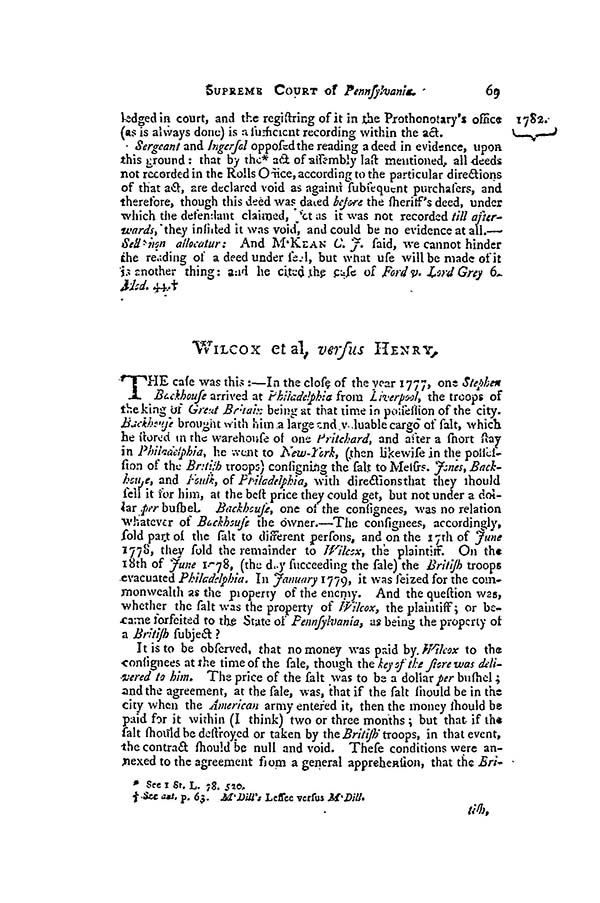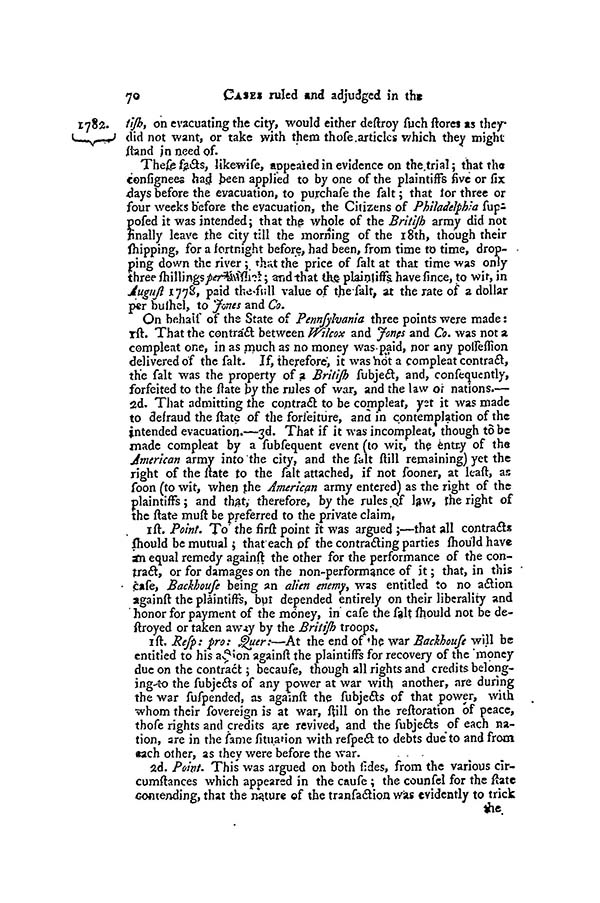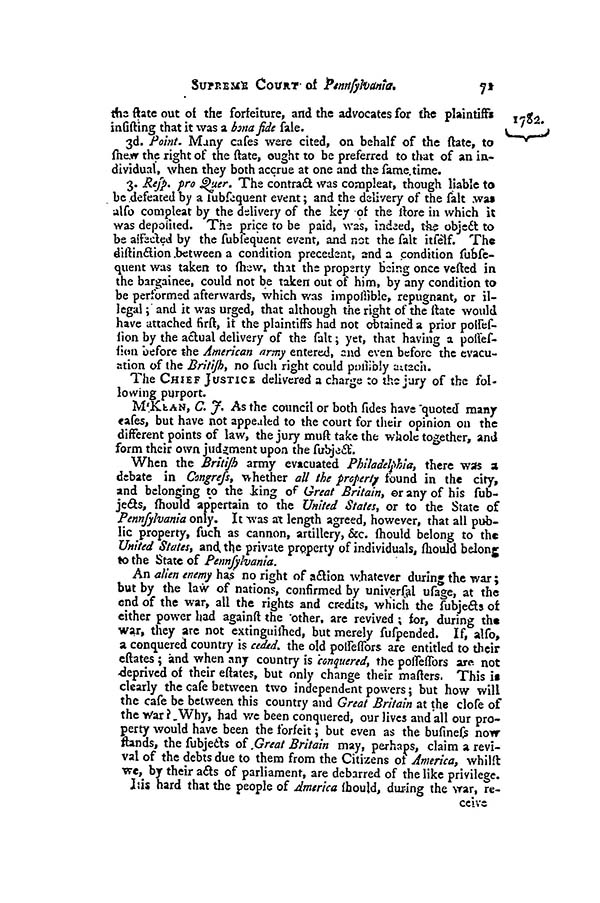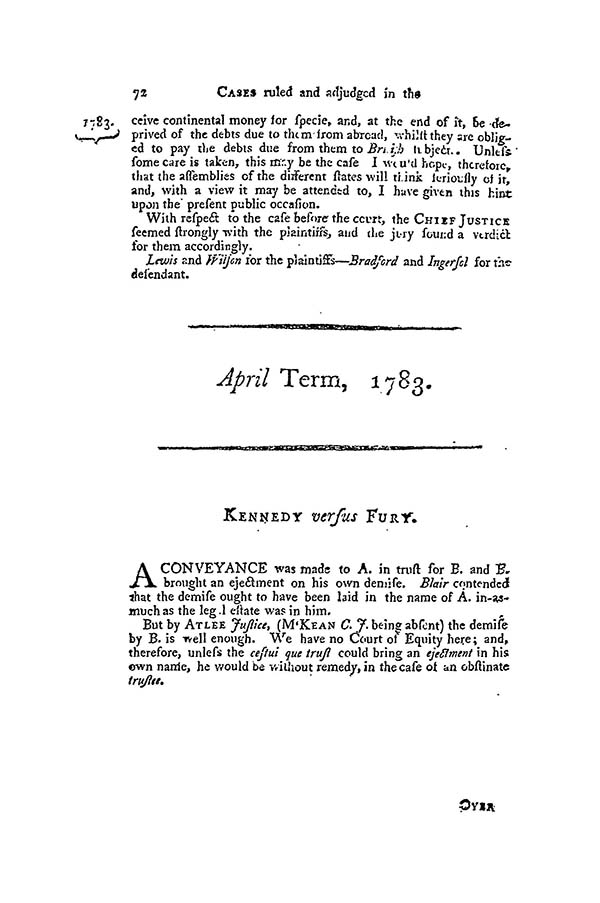Wilcox v. Henry, 1 Dall. 69 (Pa. 1782)
Supreme Court of Pennsylvania
April Term, 1782
Wilcox et al. versus Henry.
The case was this:—In the close of the year 1777, one Stephen Backhouse arrived at Philadelphia from Liverpool, the troops of the king of Great Britain being at that time in possession of the city. Backhouse brought with him a large and valuable cargo of salt, which he stored in the warehouse of one Pritchard, and after a short stay in Philadelphia, he went to New-York, (then likewise in the possession of the British troops) consigning the salt to Messrs. Jones, Backhouse, and Foulk, of Philadelphia, with directions that they should sell it for him, at the best price they could get, but not under a dollar per bushel. Backhouse, one of the consignees, was no relation whatever of Backhouse the owner.—The consignees, accordingly, sold part of the salt to different persons, and on the 17th of June 1778, they sold the remainder to Wilcox, the plaintiff. On the 18th of June 1778, (the day succeeding the sale) the British troops evacuated Philadelphia. In January 1779, it was seized for the commonwealth as the property of the enemy. And the question was, whether the salt was the property of Wilcox, the plaintiff; or became forfeited to the State of Pennsylvania, as being the property of a British subject?
It is to be observed, that no money was paid by Wilcox to the consignees at the time of the sale, though the key of the store was delivered to him. The price of the salt was to be a dollar per bushel; and the agreement, at the sale, was, that if the salt should be in the city when the American army entered it, then the money should be paid for it within (I think) two or three months; but that if the salt should be destroyed or taken by the British troops, in that event, the contract should be null and void. These conditions were annexed to the agreement from a general apprehension, that the British,
These facts, likewise, appeared in evidence on the trial; that the consignees had been applied to by one of the plaintiffs five or six days before the evacuation, to purchase the salt; that for three or four weeks before the evacuation, the Citizens of Philadelphia supposed it was intended; that the whole of the British army did not finally leave the city till the morning of the 18th, though their shipping, for a fortnight before, had been, from time to time, dropping down the river; that the price of salt at that time was only three shillings per bushel; and that the plaintiffs have since, to wit, in August 1778, paid the full value of the salt, at the rate of a dollar per bushel, to Jones and Co.
On behalf of the State of Pennsylvania three points were made: 1st. That the contract between Wilcox and Jones and Co. was not a compleat one, in as much as no money was paid, nor any possession delivered of the salt. If, therefore, it was not a compleat contract, the salt was the property of a British subject, and, consequently, forfeited to the state by the rules of war, and the law of nations.—2nd. That admitting the contract to be compleat, yet it was made to defraud the state of the forfeiture, and in contemplation of the intended evacuation.—3rd. That if it was incompleat, though to be made compleat by a subsequent event (to wit, the entry of the American army into the city, and the salt still remaining) yet the right of the state to the salt attached, if not sooner, at least, as soon (to wit, when the American army entered) as the right of the plaintiffs; and that, therefore, by the rules of law, the right of the state must be preferred to the private claim.
1st. Point. To the first point it was argued;—that all contracts should be mutual; that each of the contracting parties should have an equal remedy against the other for the performance of the contract, or for damages on the non-performance of it; that, in this case, Backhouse being an alien enemy, was entitled to no action against the plaintiffs, but depended entirely on their liberality and honor for payment of the money, in case the salt should not be destroyed or taken away by the British troops.
1st. Resp: pro: Quer:—At the end of the war Backhouse will be entitled to his action against the plaintiffs for recovery of the money due on the contract; because, though all rights and credits belonging to the subjects of any power at war with another, are during the war suspended, as against the subjects of that power, with whom their sovereign is at war, still on the restoration of peace, those rights and credits are revived, and the subjects of each nation, are in the same situation with respect to debts due to and from each other, as they were before the war.
2nd. Point. This was argued on both sides, from the various circumstances which appeared in the cause; the counsel for the state contending, that the nature of the transaction was evidently to trick
3rd. Point. Many cases were cited, on behalf of the state, to shew the right of the state, ought to be preferred to that of an individual, when they both accrue at one and the same time.
3. Resp. pro Quer. The contract was compleat, though liable to be defeated by a subsequent event; and the delivery of the salt was also compleat by the delivery of the key of the store in which it was deposited. The price to be paid, was, indeed, the object to be affected by the subsequent event, and not the salt itself. The distinction between a condition precedent, and a condition subsequent was taken to show, that the property being once vested in the bargainee, could not be taken out of him, by any condition to be performed afterwards, which was impossible, repugnant, or illegal; and it was urged, that although the right of the state would have attached first, if the plaintiffs had not obtained a prior possession by the actual delivery of the salt; yet, that having a possession before the American army entered, and even before the evacuation of the British, no such right could possibly attach.
The Chief Justice delivered a charge to the jury of the following purport.
M'Kean, C. J. As the council or both sides have quoted many cases, but have not appealed to the court for their opinion on the different points of law, the jury must take the whole together, and form their own judgment upon the subject.
When the British army evacuated Philadelphia, there was a debate in Congress, whether all the property found in the city, and belonging to the king of Great Britain, or any of his subjects, should appertain to the United States, or to the State of Pennsylvania only. It was at length agreed, however, that all public property, such as cannon, artillery, &c. should belong to the United States, and the private property of individuals, should belong to the State of Pennsylvania.
An alien enemy has no right of action whatever during the war; but by the law of nations, confirmed by universal usage, at the end of the war, all the rights and credits, which the subjects of either power had against the other, are revived; for, during the war, they are not extinguished, but merely suspended. If, also, a conquered country is ceded. the old possessors are entitled to their estates; and when any country is conquered, the possessors are not deprived of their estates, but only change their masters. This is clearly the case between two independent powers; but how will the case be between this country and Great Britain at the close of the war? Why, had we been conquered, our lives and all our property would have been the forfeit; but even as the business now stands, the subjects of Great Britain may, perhaps, claim a revival of the debts due to them from the Citizens of America, whilst we, by their acts of parliament, are debarred of the like privilege.
It is hard that the people of America should, during the war, receive
With respect to the case before the court, the Chief Justice seemed strongly with the plaintiffs, and the jury found a verdict for them accordingly.
Lewis and Wilson for the plaintiffs—Bradford and Ingersol for the defendant.
Citation: Wilcox v. Henry, 1 U.S. 69, 1 Dall. 69 (Pa. 1782)




Last modified: December 11, 2014